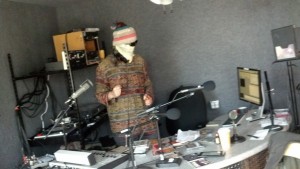I’m looking forward to this Sunday morning, when I will be on the Gramophoney Baloney show again over at Radio Valencia in San Francisco. This week the show’s host DJ McShmormac is planning a four hour Armistice Day special. I asked him for specifics on Facebook:
“4 hours of recordings dating from the WWI-era 1914-1918 10am-2pm – with your good self,” McShmormac replied, “covering similar territory as the two pre-1913 shows you were on, and possibly a live musician who I won’t mention, in case she doesn’t show up.”
Well, that leaves a lot of room for creativity, of which I’m sure that there will be plenty. But all these shows about century-old music got me thinking, what if broadcast radio had really gotten started before the First World War, rather than afterwards?
The master narrative of broadcast radio goes as follows: Marconi and others developed wireless Morse code transmission in the 1890s. Canadian inventor Reginald Fessenden began experimenting with the transmission of the human voice in the early 20th century. But it wasn’t until the 1920s that engineers had access to alternators powerful enough and consumers access to receivers sophisticated enough to economically broadcast and receive talk and music over the airwaves. That’s when broadcast radio really took off in the USA, most famously at KDKA in Pittsburgh.
What if this technological innovation had taken place by 1900, with broadcast radio becoming all the rage around 1906? Counterfactual history is always a dicey intellectual gambit. But here are three possibilities, in order of my level of surety.
1. Radio would have been massively censored during the First World War. By the end of the war, three federal laws pretty much sewed up what newspapers could say about the conflict. Dozens of publications found themselves censored. Thousands of folks who opposed US involvement wound up in prison, including Eugene V. Debs, head of the Socialist Party.
Given this record, it’s no stretch to conjecture that broadcast radio would have found itself trapped in the censorship web, especially given that licenses for the stations would have been controlled by the government, as they are now. Radio would have been scarred by the experience, as were a generation of newspaper editors and reporters.
2. The telephone industry would have played much more of a role in broadcast radio. The whole US telecommunications system was nationalized during World War I. It seems likely that radio would have been as well. That means it would have come under the purview of AT&T executives, picked by the government to oversee the system.
In real history, AT&T experimented with radio station ownership after the war, but backed off after a conflict with another radio station brought it bad publicity. I think it is far more likely that World War I would have given the telephone industry a greater footprint in broadcast radio. Whether that would have been a good or bad thing is unclear. The optimal result would have been a more mixed system of ownership that didn’t leave the “broadcast” industry so completely in charge. The bad result would have been integrating radio into the mid-20th century AT&T monopoly.
3. Broadcast radio would have been more comprehensively covered by copyright law
I’m less certain about this one, but it seems possible that the Copyright Act of 1909 would have somehow covered broadcast radio if it was flourishing around that time. The Act created a compulsory license law that allowed player piano roll and then record producers to make “mechanical” copies of musical compositions as long as they honored the conditions of the composition license. The law surely would have covered radio in some way if it had been around, perhaps extending some kind of performance royalty largess to musicians and artists whose recorded artistry reached the airwaves.
It wouldn’t be until 1976 that Congress updated its Copyright Act to cover new technologies. By then a federal judge had ruled that playing a record on the radio did not constitute any kind of copying of a performance. Judge Learned Hand understandably could not wrap his brain around the concept of “copies of copies,” an idea easier for us Internet folk to grok. The Copyright Act of 1976 more or less adhered to his logic for broadcast radio, while ‘Net radio wound up paying performance royalties. We’ve been fighting about fixing this inequality ever since.
What a difference a dozen years makes [maybe]. That’s enough conjecture for one post. Don’t forget to tune into radiovalencia.fm on Sunday.



